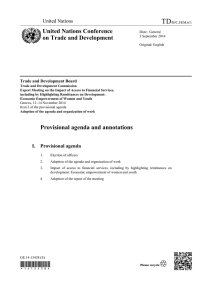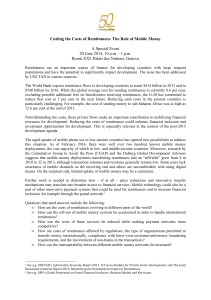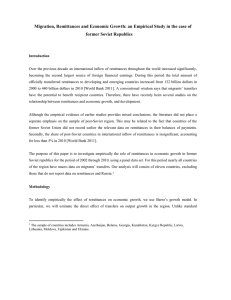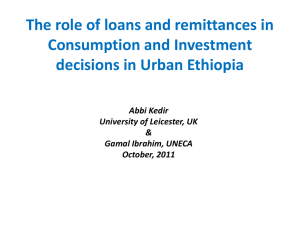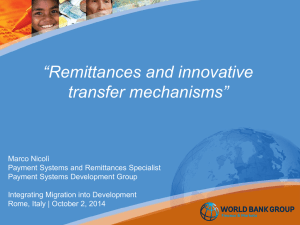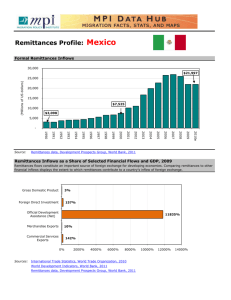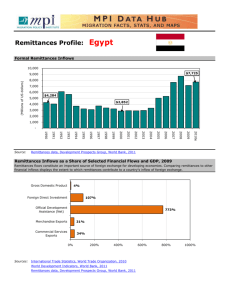TD United Nations Conference on Trade and Development United Nations
advertisement
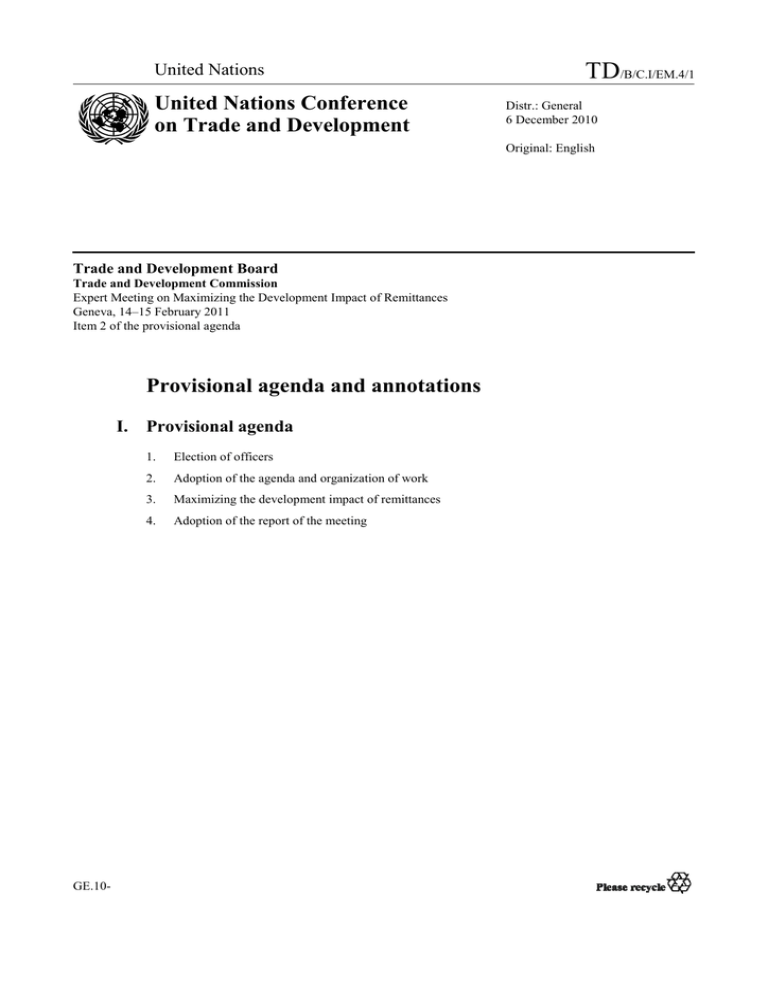
United Nations United Nations Conference on Trade and Development TD/B/C.I/EM.4/1 Distr.: General 6 December 2010 Original: English Trade and Development Board Trade and Development Commission Expert Meeting on Maximizing the Development Impact of Remittances Geneva, 14–15 February 2011 Item 2 of the provisional agenda Provisional agenda and annotations I. Provisional agenda GE.10- 1. Election of officers 2. Adoption of the agenda and organization of work 3. Maximizing the development impact of remittances 4. Adoption of the report of the meeting TD/B/C.I/EM.4/1 II. Annotations to the provisional agenda Item 1. Election of officers 1. It is recommended that the expert meeting elect a Chair and a Vice-Chair-cumRapporteur. Item 2. Adoption of the agenda and organization of work 2. The provisional agenda for the expert meeting is reproduced in chapter I above. A detailed programme will be available one week before the meeting. Documentation TD/B/C.I/EM.4/1 Item 3. Provisional agenda and annotations Maximizing the development impact of remittances 3. The Trade and Development Board, at its fiftieth executive session, held on 8 July 2010, approved the following topic for a single-year expert meeting on the topic “Maximizing the development impact of remittances”. 4. The expert meeting will explore ways and means to maximize the development impact of remittances by reviewing the recent trends in migration and remittance flows, analysing the impact of remittances on poverty reduction and development in home countries, policies and measures that can channel saved remittances and other diaspora funds to better serve the developmental needs of home countries, and finally addressing barriers to remittance flows, including barriers to migration which impede the expansion of future remittance flows. 5. Remittances flows to developing countries have been growing quickly, constituting an important source of external financing for them. Remittances received by developing countries are now much larger than annual official development aid and they have been shown to be resilient relative to foreign direct investment during the financial and economic crisis. Remittances are in many cases directly received by the poor, thus augmenting their income and alleviating their poverty. Various studies have shown positive linkage between remittances and poverty reduction. 6. The way in which remittances are used can produce wide multiplier effects in national development. As the majority of remittances are used in purchasing essential goods and services produced locally, the impact of remittances on local demand and production is the most direct. When a share of remittances is used for saving and small business investments, the multiplier effect becomes higher and more sustainable as such activities create income stream. Meanwhile, other funds from diasporas can be utilized to finance infrastructure building and public services provision, stabilize balance of payments and improve external borrowing credibility, and promote business and knowledge/skills transfer. The meeting will therefore focus on policies and measures that can channel saved remittances and other diaspora funds to better serve the developmental needs of home countries. 7. Significant barriers exist to harnessing the opportunities brought about by remittances in reducing poverty and promoting development. These barriers can be summarized into two categories. The first relates to remittances transactions and distribution, such as affordability and accessibility for remittance senders to use safer and more secure formal transfer channels, information asymmetries, and taxation on remittances that all increase the risk or cost of sending remittances. The second category 2 TD/B/C.I/EM.4/1 relates to migration that impedes new flows or future expansion of remittances, such as numerical migrant quotas, burdensome visa requirements and procedures, lack of access to income protection and other forms of social security and policy coherence in sending countries. The meeting will identify solutions to reducing the cost of remittances transactions and expanding future flow of remittances. In addressing the barriers to migration, particular emphasis will be given to the role of trade agreements at the bilateral, regional and multilateral levels concerning movement of natural persons (mode 4), bilateral cooperation arrangements (such as bilateral labour agreements) between sending and receiving countries and policy coherence in sending countries. 8. To facilitate discussion, the UNCTAD secretariat has prepared an issues note. In addition, experts are encouraged to prepare brief papers on the subject under discussion, which will draw on national experiences. These papers will be made available at the meeting in the form and language in which they are received. Documentation TD/B/C.I/EM.4/2 Item 4. Maximizing the development impact of remittances Adoption of the report of the meeting 9. The report of the expert meeting will be submitted to the Trade and Development Commission at its next session. The expert meeting may wish to authorize the Rapporteur, under the authority of the Chair, to prepare the final report after the conclusion of the meeting. Inputs from experts Experts nominated by member States are encouraged to submit brief papers (approximately five pages) as contributions to the work of the meeting. The papers will be made available at the meeting in the form and language in which they are received. They should be submitted to the UNCTAD secretariat in advance of the meeting, and addressed to Mr. David Vivas Eugui or Ms. Liping Zhang, Palais des Nations, CH-1211, Switzerland; fax: 41 22 917 0044; e-mail: david.vivas.eugui@unctad.org, liping.zhang@unctad.org. 3
